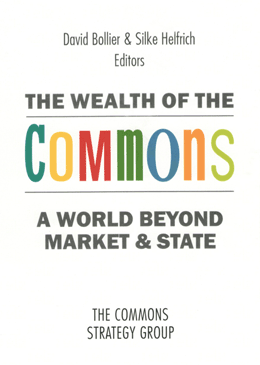“How would we know when we are commoning?” a young woman asked me at Contact Summit 2011, a major unconference running concurrently with the Occupy Wall Street protests in New York, October 2011. (An “unconference” is a gathering based on participant-generated content.)
When I announced the invitation to my session on commoning, I introduced it by quoting the motto of our School, “Education for Commons Culture & Social Renewal.” I explained: “Creating a commons culture is re-inventing all our social institutions for serving the whole, not the few as they do today. Let’s find out how commoning can help us achieve that.”
Members’ driving questions are the key initial resource of any ad hoc learning commons. In such a commons, “we know we are commoning” when we create and maintain an issues list, a collection of burning questions and engage in action-oriented, collaborative inquiries to address them. Therefore, we started by exploring the questions that participants had about three stages that characterize commoning:
- The ensemble of practices used by people in the course of managing shared resources and reclaiming the commons. In its simplest form, commoning is creating and maintaining something collectively.
- Moving from the Me to the We, where people become capable of thinking, feeling and acting as co-creative collective entities, without surrendering their individual autonomy.
- Recognizing the inherent connectedness of humanity as a whole, and keeping our individual and collective “center of gravity” one with it.
The School of Commoning is a commons-based social enterprise established in London under UK law, as a Community Interest Company, in May 2011. Our mission is to enhance individual and collective competences in the creation, protection and governance of commons of all types – natural, cultural and intellectual.
We are running workshops, seminars, retreats, online courses, and creating educational materials in print, video, and a Commoning Game. The School plans to provide training programs for commons facilitators and customized curricula for institutions of higher education.
The School of Commoning maintains a wiki-based Knowledge Garden, one of the largest repositories of commons-related non-academic documents of global relevance. Special sections are dedicated to the commons movement and the issues of a transition to a commons-based society, as well as a questions-driven introductory module for those who are new to the commons. This is a Creative Commons-licensed space where users can browse, add to, quote, reuse and remix resources. We also host a regular Commoning Café in London, a networking event that, for many, serves as a first point of entry to the world of commons.
Our educational activities have included an online/onsite workshop on “Reclaiming the Commons as a Social Theory of Collective Action” that we facilitated at the Occupy Wall Street Forum on the Commons in New York. Along with the Christian Council for Monetary Justice, we organized an intense “12 days, 12 seminars” program led by James Quilligan, who is also an advisor to our School, on various issues involving the shift towards a commons-based economy. The kick-off seminar was hosted, where else…in the House of Commons.
Our series, the “Commons in Our Life,” is aimed at fostering the emergence of new commons, in various areas of social practice. Each event will be dedicated to understanding and supporting the commons in one particular domain of social regeneration that we care about, e.g., health, land use and urbanism, finance, etc. Our Commons Advisory Services work with an international network of leading thinkers and practitioners to provide commons design and consulting services to organizations in civil society, and the public and private sectors.
Commoning is also partnering. Our partners include CommunityIntelligence, Global Commons Trust, Kosmos Journal, Notre Dame University, the P2P Foundation, and the United Nations Institute for Training and Research. If our work inspires your group and you want to explore a collaborative relationship with the School of Commoning, let us know.
References
 Buy at Levellers Press
Buy at Levellers Press